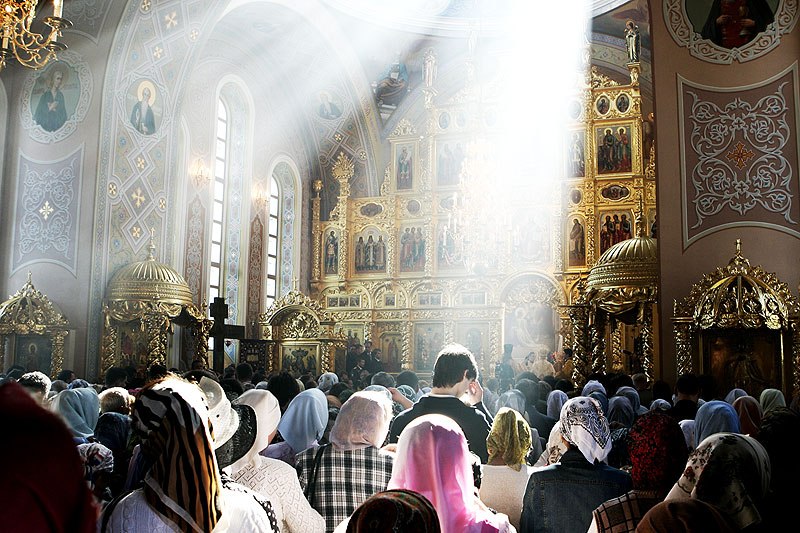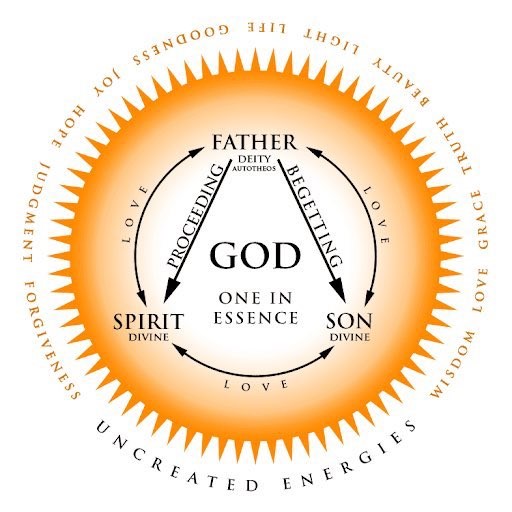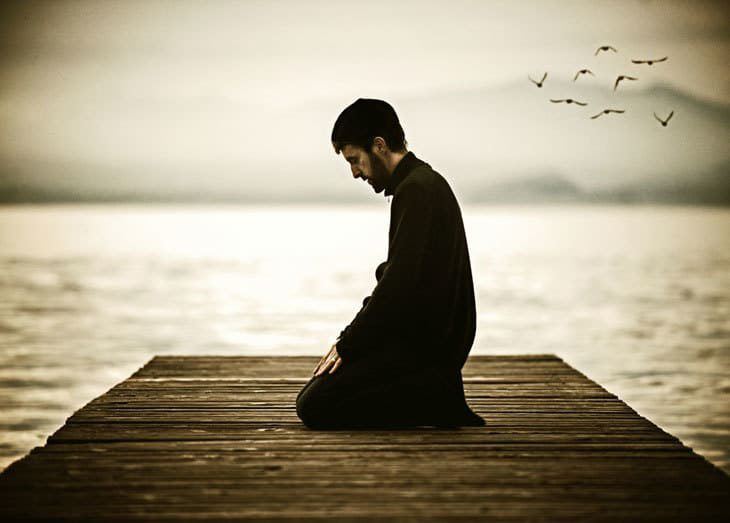The Orthodox Church’s Teachings on Angels
In this post, we explore the Orthodox Church’s teachings on angels and explain the role they play in heaven and on earth.
On this page, we explain many of the foundational teachings of that ancient Christian Faith known today as the Orthodox Church. A succinct statement of the beliefs of the Church can be found in the Nicene Creed.
First and foremost, the Orthodox view the Christian Faith and the Church as inseparable. In other words, we cannot know Christ, share in the life of the Holy Trinity, or consider ourselves Christian, apart from the Church. There cannot be one without the other. With that said, let us first look at how the Orthodox Church understands God Himself.
Related: Are All Orthodox Churches The Same?

Imagine the historic Christian Faith is like the perfect recipe, and each of these churches is a different kind of chef. The Orthodox chef follows the recipe to the letter, recreating the dish and preserving the beauty its creator envisioned. The Roman Catholic chef, by contrast, tends to add things to the dish, while the Protestant one leaves things out. Similarly, only the Orthodox Church authentically preserves the historic Christian Faith, without adding to, subtracting from, or distorting its dogma and doctrine.

God is beyond all human understanding. If He could be grasped by our minds, He would not be God. He is at once altogether different from us, yet He is uniquely close to us, present everywhere and filling all things in a very personal way. We know what we know about God because He revealed those things to us. Ultimately, everything beyond that is all guess work! And Orthodoxy prefers to admit the limits of human logic rather than attempt to explain the unexplainable. Here is what we do know about the nature of God:
Like many other Christians, we believe in a single God who is at once one and three. Father, Son, and Holy Spirit. The Holy Trinity is three distinct divine persons (hypostases), who share one divine essence, dwelling in each other by virtue of an unceasing movement of mutual love. The persons of the Trinity are uncreated, immaterial and eternal. Moreover, the Trinity has one will; they do not act separately, though each may act in a different manner (i.e. we experience them differently). We can experience the Trinity in the life of the Church, through the Holy Sacraments. And when we encounter any one of the three, we experience contact with the One True God.
The Orthodox Church sees the Father as the eternal source of the Godhead, and the bond of unity between the three. The Son is begotten eternally from Him, fully God and fully man, and is our “bridge” to God via the Incarnation. Finally, the Holy Spirit, the “wind” or “breath” of God, proceeds eternally from the Father. These teachings are affirmed by both the Church Fathers and the Seven Ecumenical Councils. Note that parts of this differ significantly in the Roman Catholic church, which states the Holy Spirit proceeds from the Father and the Son (filioque).
Read More: Do Christians Worship The Same God As Jews And Muslims?
The Incarnation is the central dogma in the Orthodox Church (and all Christianity). Incarnation refers to the Son and Word of God becoming flesh (John 1:14). Essentially, this dogma states that the eternal Son and Word of God, the second person of the Holy Trinity, assumed our human nature and became man. However, His Divinity never changed. Thus, Jesus Christ is fully God and fully man.
To the Orthodox, Christ is much more than a pious man, a prophet, or a profound teacher of morality. He is the Theanthropos (God-Man) who fulfills God’s promise to Abraham, and fulfills the Law and the Prophets. He is our Savior, having restored humanity to fellowship with God.
Eastern Orthodox Christians believe the incarnate Word of God is one Person in two natures, fully divine and fully human. Christ had a divine will with spiritual incentives, and a human will with fleshly desires. He had a human body, mind, and spirit capable of giving in to temptation and suffering, just like us. In Him, divinity and humanity unite, without the destruction of either reality. Christ embodies God’s love, and shows us we can experience communion with Him. The Church Fathers summarize the ministry of Christ perfectly: “God became what we are so that we may become what He is.”
Perhaps the most important question for any Christian is: how am I saved? This ties in with the doctrine of the Incarnation. Christ’s taking on our humanity and placing it at the right hand of the Father provides us with a new path toward communion with God. Only in and through Christ can we truly be saved (John 14:6). In other words, nothing we personally do, say, or believe will earn us our salvation. It is a gift from God that requires our cooperation.
For the Orthodox, salvation means achieving theosis, or becoming like God. By God’s Grace we can become what Jesus Christ is by nature. Salvation is, therefore, more than a one-time acceptance of Christ (once saved, always saved). And it is far more complex than just making it to heaven and avoiding hell. It is a process that encompasses not only the earthly life, but also the eternal life of the age to come.
In theosis, we take on God’s attributes. However, we do not merge with the Holy Trinity. There is union without fusion. A sword held in a flame gradually takes on the properties of that flame (light and heat), but still remains a sword. Similarly, through theosis we take on God’s properties, while still remaining human. We become adopted sons and daughters of the Most High (Ps. 82:6; John 10:34), like our Father but not the same as Him.
Read More: Is There Grace Outside The Church?

The teachings of the Orthodox Church place incredible importance on the Bible, but not in the way most Protestants probably expect. Our worship is highly liturgical (communal, organized, ceremonial, and done decently and in order). It reflects depictions of worship in the Old Testament and Revelation. Our worship is also very Scriptural; it is a mosaic of quotations, paraphrases, references, and allusions. It is, quite literally, “to pray the Bible!” During every service celebrated in the Church, the priest, deacon, chanter, and choir read aloud portions of the Bible. Holy Scripture is an integral part of Orthodox spiritual life; however, it is not the only part, nor is it arguably the “most important.”
Unlike most Western Christians, we do not believe in the false doctrine of Sola Scriptura. We understand that Scripture came to us from Holy Tradition, the oral and written Tradition of the Church. Without it, the Scriptures would not exist. Holy Tradition is also witnessed to by the decisions of the Ecumenical Councils, the Nicene Creed, the writings of the Fathers of the Church, our liturgical worship and iconography, and in the lives of the Saints.
Holy Tradition is dynamic and adapting, while at the same time always remaining the same. Thanks to Holy Tradition, the Orthodox Church has managed to preserve the doctrines of the Christian faith as they were at the time of Christ and His Apostles, while still remaining relevant to Christians of every era. The Life of the Church does not change to satisfy our personal preferences. Instead, it is there to change us and bring healing to our tarnished souls.
Orthodox theology views sin as any behavior that “misses the mark,” or fails to live up to the higher goal of living as an icon of Christ. The Orthodox do not view sin in a legalistic manner. Nor do we view it as a guilty stain on the soul in desperate need of cleansing. Instead, the Orthodox Church teaches that sin is a sickness one must constantly struggle to overcome. We participate in the Mystery of Confession, during which a spiritual father helps you reflect on your sins and reach true repentance. Because each person’s experience is unique, conquering your sinful habits requires individual attention, correction, and perseverance.

The Orthodox Church teaches that Heaven and Hell are different experiences of God’s grace and presence in eternity. They are not necessarily real physical places. All mankind enters into the presence of God after death, since He is everywhere present and fills all things. Depending on our spiritual states and preparedness, we will experience His presence either as light, peace, joy, and rest…or as darkness, shame, and anguish. Hell is neither the absence of God, nor the separation of the soul from the presence of God. Because God is everywhere present, Heaven and Hell are both the fully manifest divine presence.
Read More: What Happens When We Die?
In the Eastern Orthodox tradition, we refer to the Virgin Mary as Theotokos. Translated from Greek, this word means “God-bearer.” By bearing Jesus Christ, Mary also bore the Son of God, who is also God Himself (see above). Thus we give her the title, Theotokos.
The Orthodox venerate Mary as a role model to both men and women seeking to live godly lives. She holds an incredibly high position of importance in the Church. To illustrate how special she is, we sing to her and ask for her intercessions during almost every service. To be clear: we do not worship Mary, but instead venerate her and seek her intercessions before God. Just as we might ask a friend to pray on our behalf, we do the same with the Theotokos.
In Orthodox Tradition, we ask for the intercessory prayers of the Saints, including the Theotokos. These holy men and women intercede for us before the throne of God. While we do make requests of them in prayer, we do not worship them. As our fellow human beings, Saints serve as excellent examples for us. They show us how to live a life focused on Christ and how, with the Lord’s help, we, too, can attain salvation as they have.
In this post, we explore the Orthodox Church’s teachings on angels and explain the role they play in heaven and on earth.

In this post, we explore Saint Gregory Palamas’ contributions to Orthodox Christian theology and his defense of hesychasm.
To fight against heresy, the Church convened seven Ecumenical Councils. In this post, we explain the sacred teachings these councils protect.

In this post, we explore the Orthodox Church’s teachings about tattoos and body piercings.
***If you would like to offer prayers for living and departed, please submit two separate requests: one for the living and one for the departed.